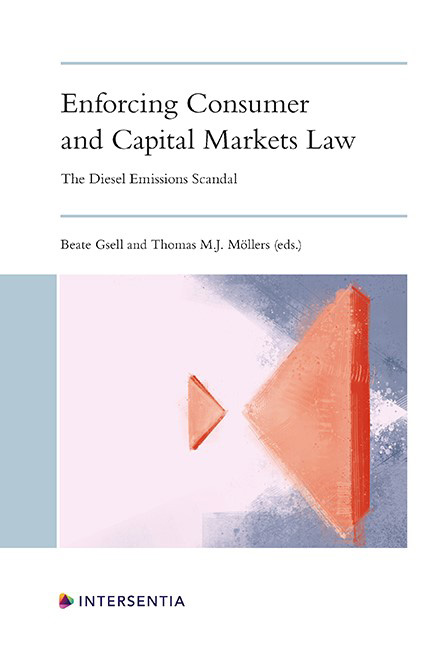Book contents
- Frontmatter
- Acknowledgement
- Contents
- List of Cases
- List of Abbreviations
- List of Contributors
- PART I INTRODUCTION
- PART II EUROPE
- PART II BEYOND EUROPE
- PART III THE SUPRANATIONAL PERSPECTIVE
- PART IV LEGAL PRACTICE PERSPECTIVE
- PART V INTRADISCIPLINARY ANALYSIS AND REFORM RECOMMENDATIONS
- Key Source Bibliography
- Index
- About the Editors
Enforcing Consumer and Capital Markets Law in Australia
Published online by Cambridge University Press: 22 December 2020
- Frontmatter
- Acknowledgement
- Contents
- List of Cases
- List of Abbreviations
- List of Contributors
- PART I INTRODUCTION
- PART II EUROPE
- PART II BEYOND EUROPE
- PART III THE SUPRANATIONAL PERSPECTIVE
- PART IV LEGAL PRACTICE PERSPECTIVE
- PART V INTRADISCIPLINARY ANALYSIS AND REFORM RECOMMENDATIONS
- Key Source Bibliography
- Index
- About the Editors
Summary
Volkswagen was ranked ninth of the Fortune 500 companies in 2018 with revenue in 2018 of US$278 billion. Revenue growth since 2004 has been 152 per cent. Around the time of the announcement of the emissions scandal in late 2015 it had just achieved prominence as the largest manufacturer of vehicles in the world.
In Australia, purchasers of the affected vehicles which are the subject of the present proceedings referred to in this chapter paid around A$5 billion for the vehicles.
This chapter examines the enforcement of consumer and capital market law in Australia with particular reference to recent litigation in the Federal Court of Australia arising out of the diesel emissions scandal. This encompasses an assessment of public sanctions, private claims and procedural law in general and class action mechanisms in particular.
In keeping with the focus of this publication there is an evaluation of the domestic legal procedures and remedies available in the event of:
- an automobile manufacturer producing motor vehicles with emission values that are manipulated resulting in a material defect in the vehicle whereby consumers who purchase such vehicles suffer a loss of the vehicle's value as a result of such defect (Case 1); and
- a material decrease in the share price following disclosure to the Stock Exchange of information concerning the manipulation of the emission values (Case 2).
The ‘hypothetical’ scenario in Case 1 is of course based on the present VW diesel emissions scandal. This scandal has given rise to protracted legal proceedings in the Federal Court of Australia against various Volkswagen, Audi and Skoda entities. This litigation is examined in some detail below.
The Case 2 scenario is presently the subject of extensive litigation in Europe and elsewhere on behalf of shareholders who claim to have suffered loss and damage as a result of the decline in the value of relevant shares. At present there is no equivalent litigation against VW entities in Australia although Australian litigation funders are involved in financing shareholder litigation against VW entities in other jurisdictions. The substantive and procedural law relevant to shareholder litigation in Australia is examined below.
PRIVATE LAW AND CIVIL PROCEDURE
Statutory class actions were first introduced in Australia on 4 March 1992 in the Federal Court as a result of Part IVA of the Federal Court of Australia Act 1976 (Cth) coming into operation.
- Type
- Chapter
- Information
- Enforcing Consumer and Capital Markets LawThe Diesel Emissions Scandal, pp. 257 - 290Publisher: IntersentiaPrint publication year: 2020

